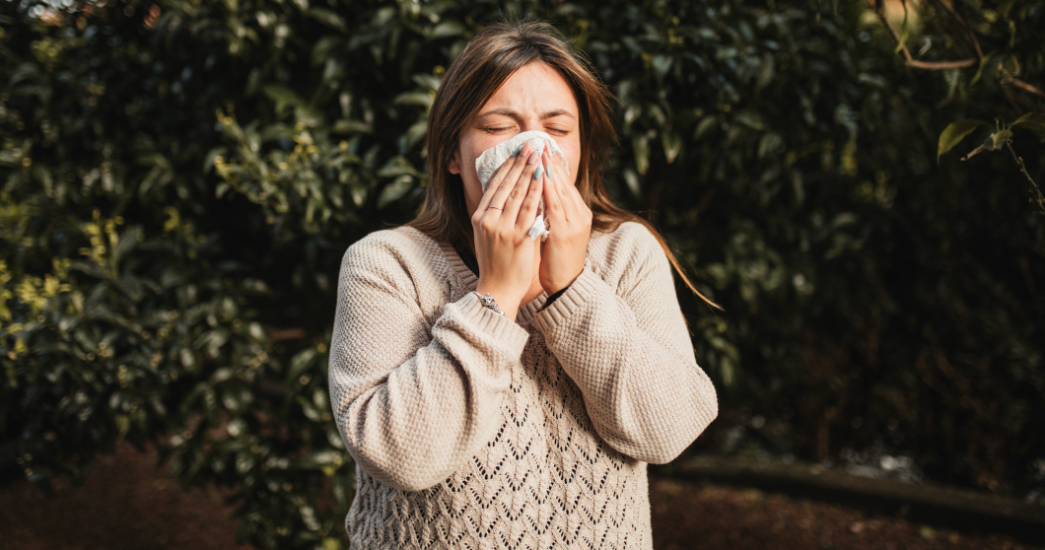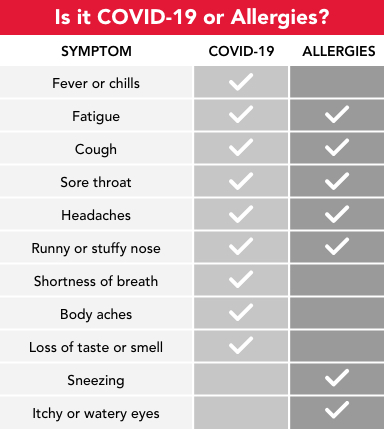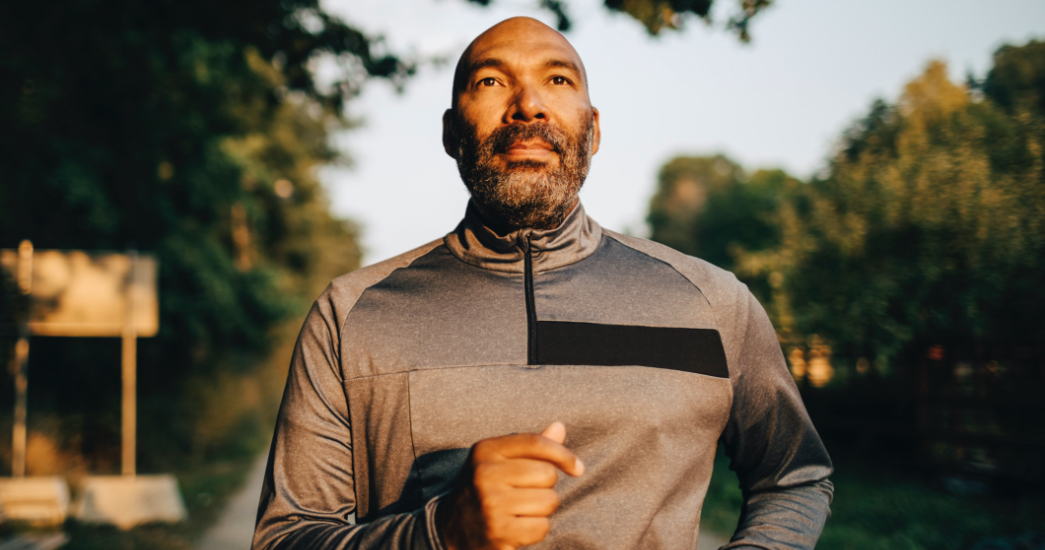
Published June 2021
There was a time when runny noses, sore throats or coughs that happened in the spring, summer or fall would just be attributed to seasonal allergies. Then came COVID-19. Now, even though vaccination rates are rising across the country and cases are falling, these symptoms may still cause us to wonder if they’re due to COVID-19 or allergies.
Seasonal allergies (or allergic rhinitis) occur when your immune system recognizes an outdoor allergen and reacts by releasing histamines, among other chemicals, into your bloodstream. The result is commonly referred to as an allergic reaction. Seasonal allergies can be attributed to various wind-pollinated grasses, trees and weeds that we come in contact with daily—mostly in the spring, but also in the summer and fall months.
COVID-19, on the other hand, is a virus that attacks the respiratory system. Rather than spreading through harmless allergens like pollen, COVID-19 is spread by contagious, airborne droplets from people infected with the virus, as well as by touching your eyes, mouth and nose with unwashed, virus-containing hands.
How the Symptoms Compare
Although seasonal allergies and COVID-19 are vastly different, some overlap in symptoms may cause initial concern. The key is knowing which symptoms are unique to each condition, so you know what course of action to take.

Allergy Prevention and Treatment
Allergies affect a wide number of Americans — more specifically, up to 30% of adults and 40% of children. While seasonal allergies aren’t contagious, they can still pack a punch. Without prevention plans or medication, people suffering from allergies can be in for a long, uncomfortable season.
Here are some ways to minimize your exposure and keep seasonal allergies under control:
![]()
Stay inside on dry, windy days. The best days to go outside are after it’s rained, when the air is clear of pollen.
![]() Delegate outdoor maintenance like mowing lawns or planting flowers to someone else in your household, friends or neighbors. Staying outdoors for too long can trigger your allergy symptoms, especially if there’s a high pollen count.
Delegate outdoor maintenance like mowing lawns or planting flowers to someone else in your household, friends or neighbors. Staying outdoors for too long can trigger your allergy symptoms, especially if there’s a high pollen count.
![]() Keep track of outdoor pollen counts in your area through mediums such as weather apps, radio stations or television. Outdoor pollen counts measure the levels of pollen in the air, which are usually highest in the early morning.
Keep track of outdoor pollen counts in your area through mediums such as weather apps, radio stations or television. Outdoor pollen counts measure the levels of pollen in the air, which are usually highest in the early morning.
![]()
Close your windows to keep your indoor air clean.
![]() Consider using OTC (over-the-counter) medications like antihistamines or decongestants to help manage symptoms of a seasonal allergic reaction. If you’re a Harvard Pilgrim member, check to see if generic OTC allergy medications are part of your Tier 1 formulary coverage — it could result in savings.
Consider using OTC (over-the-counter) medications like antihistamines or decongestants to help manage symptoms of a seasonal allergic reaction. If you’re a Harvard Pilgrim member, check to see if generic OTC allergy medications are part of your Tier 1 formulary coverage — it could result in savings.
COVID-19 Prevention and Action
The CDC recommends following its protocols to protect yourself from the virus, which now also include getting your COVID-19 vaccine. But if you suspect you’ve contracted COVID-19 or test positive, your next steps are important to keep yourself and others safe from the virus.
Even if you only feel mild symptoms, it’s crucial that you adhere to the following guidelines:
- Recover at home. Stay away from others you may live with and don’t go to public areas.
- Keep your distance from others and wear a mask over your mouth and nose if you’re in the vicinity of other people.
- Get plenty of rest and hydrate as much as you can.
- Stay on top of your symptoms and keep in touch with your doctor.
If you have trouble breathing, a persistent pain in the chest or other more serious symptoms of COVID-19, seek emergency medical attention immediately. Dial 911 or call ahead to your local emergency facility and be sure to notify the operator that you are seeking care for COVID-19.
As more and more people get vaccinated for COVID-19 and we ease our way back into a world resembling pre-pandemic times, we’ll encounter symptoms that may give us pause, whether they’re related to seasonal allergies or even the common cold and other viruses. In fact, it’s likely we’ll experience more colds and other viruses along the way, as we did prior to the pandemic.
So, the next time you feel a sniffle coming on — don’t panic. Understanding the symptoms of seasonal allergies, colds and COVID-19 can help you make smart health care decisions. And when it comes to navigating your health, Harvard Pilgrim offers resources and support, including COVID-19 guidance to ensure members get the care they need.
To confirm eligibility for any programs or services mentioned in this article as it relates to your specific health plan, please reach out to your account executive or HR benefits team. You may also speak to our member services team at (888)-333-4742 or by sending a secure email. And for plan details and other member resources, log in to the member portal.


